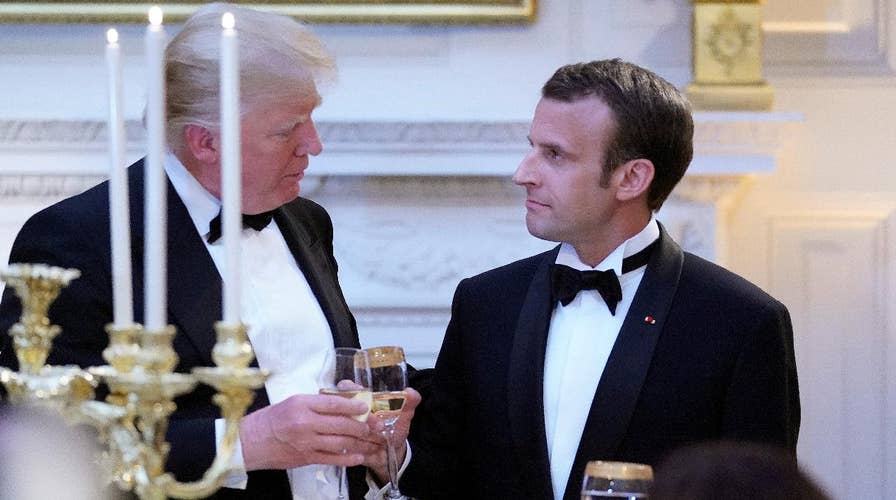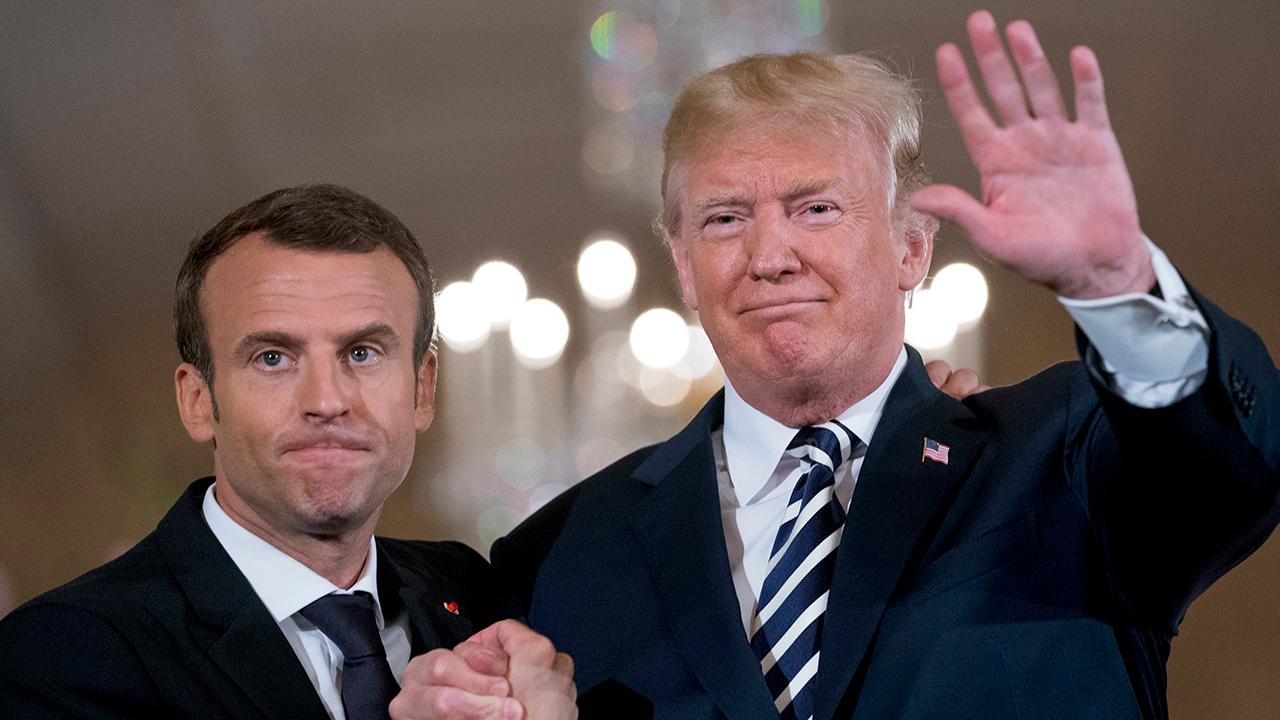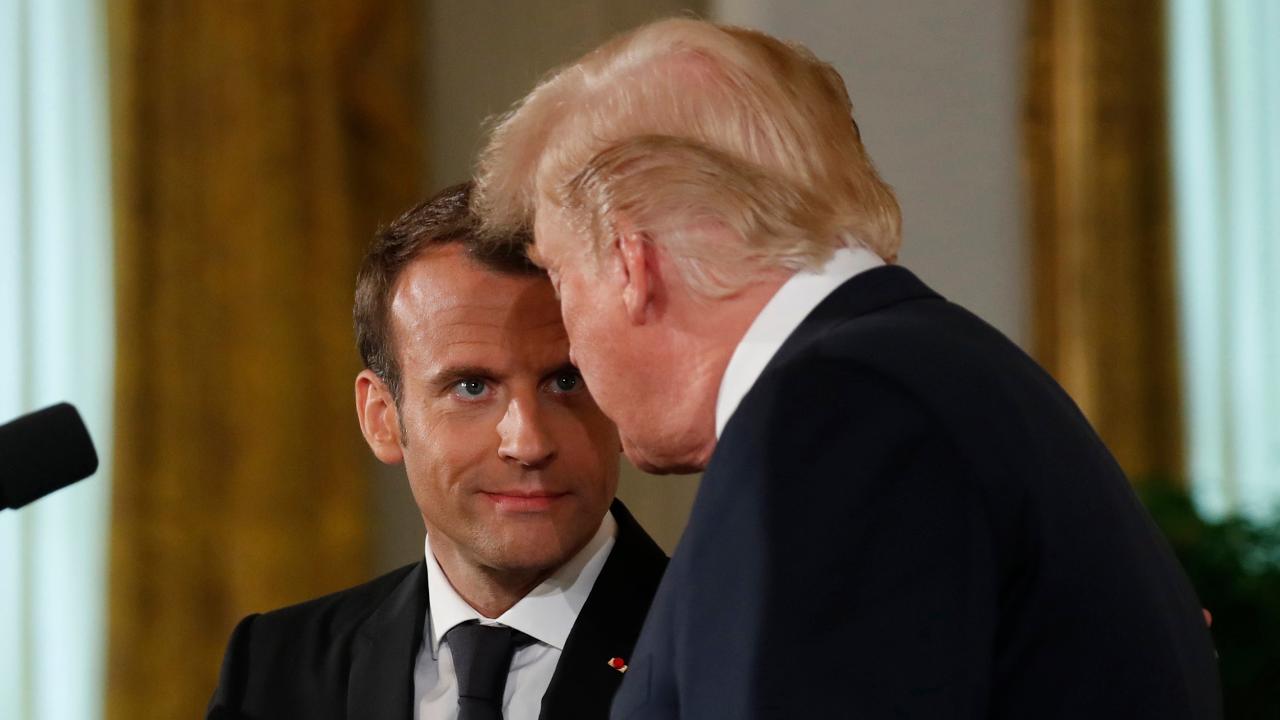Presidents Trump, Macron exchange toasts at state dinner
President Trump and first lady Melania Trump attend the State Dinner Reception with French President Emmanuel Macron and Brigitte Macron.
It makes perfect sense that President Trump honored President Emmanuel Macron of France with the first official state visit of the Trump presidency this week.
Both presidents are committed to dramatic change in their own countries. Both are businessmen and value the free market as a source of innovation, progress and wealth. Both are committed to defeating Islamist terrorists, and they have recently proven how strong their alliance is with the allied attack in Syria.
President Macron was very impressive in his interview with “Fox News Sunday” host Chris Wallace last weekend. If you take a few minutes to watch or read Macron’s clear, thoughtful answers to Chris, you will better understand why he was elected president of France.
Macron is smart and charismatic. He is self-confident, having been successful in business, government and politics. He also has a clear sense of how France needs to change if it is to be competitive in the modern world.
In a sense, Presidents Trump and Macron are both trying to drain their respective country’s swamp.
The American swamp is more bureaucratic, whereas the French swamp is more labor union-centered. But both are hostile to popular reforms and destructive to economic growth and allowing the average person to have freedom of action.
That President Trump would find his favored foreign leader in Paris may come as a surprise to many Americans. Yet, a strong American alliance with France is historically appropriate.
As President Trump pointed out during the state arrival ceremony at the White House Tuesday, France is “our oldest ally and … truly one of our great allies.”
Macron also acknowledged that the bonds shared by our countries “are based upon our deep attachment to freedom and peace.”
As President Macron noted in his address to a joint session of Congress on Wednesday, there are only two portraits hanging in the House Chamber in the Capitol building. One is of President George Washington, the father of our country. The other is of French General Marquis de Lafayette.
Congress recognized long ago that without Lafayette’s help – and through him the help of the French government – the Americans could never have the Revolutionary War that gave us our independence from Great Britain.
Indeed, it was French arms, French ammunition, French money, French troops and – at Yorktown – the French Navy that made it possible for the Continental Army to finally defeat the British.
Americans came to the aid of France twice in the 20th century, during World War I and World War II. We remained loyal allies in the years following World War II, consistently working together to prevent the expansion of the Soviet Union into Western Europe.
President Macron is at least as much of a change agent as President Trump. His book, “Revolution,” which was a best seller in France, outlined a bold program of reform. To this extent, it resembled former French President Nicolas Sarkozy’s call for change in his book, “Testimony: France in the Twenty-first Century,” published a few months before Sarkozy was elected president.
Sarkozy began as an intriguing reformer and charismatic leader of tremendous energy. In some ways, his rise resembled Macron’s. However, in the end, the French popular resistance to change – combined with Sarkozy’s inability to develop and communicate a consistent reform program – doomed him to frustration.
Macron clearly learned a lot from Sarkozy’s experience. When Macron ran for president, he created an entire political party. Fifty percent of the candidates he recruited are men and 50 percent are women.
Likewise, more than half of Macron’s recruits have never previously held elected office. Not only did Macron win the presidency, but his party won an absolute majority of the seats in the parliamentary elections. Thus, Macron has a much greater ability to implement reforms than Sarkozy had.
Despite Macron’s parliamentary advantage, he faces one challenge that President Trump does not have to overcome. There is a long tradition of French unions and other groups mobilizing and disrupting life and work. The rail unions are calling for a steady series of disruptive strikes that will make life miserable in France.
Among Macron’s opponents, there is a vivid memory of the coalition that came together in 1968 to protest President Charles de Gaulle’s programs and ultimately, a year later, drive him from office.
Since de Gaulle was the hero of French liberation in World War II and the savior of France from the Nazis, and again 13 years later in founding the Fifth Republic, being able to defeat him was an extraordinary, historic event.
That memory of defying and defeating authority remains deep within French society. It is the greatest threat Macron faces.
President Trump, on the other hand, faces a much more hostile news media (Macron was elected as the darling of the press).
In addition, President Trump inherited a Republican Party in which a large block opposed him –and many still do.
However, the United States has a much larger, more dynamic economy than France, and President Trump has a lot of momentum from economic growth and from successfully pushing back regulations, cutting taxes and appointing conservative judges.
These are the two leading reformers on the planet today, and I suspect both men will feel strengthened and emboldened by the time they have spent together this week.



